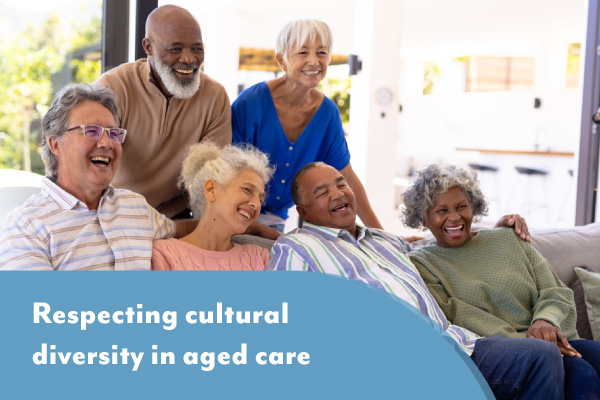Aged care is a culturally diverse sector that brings people together from many different backgrounds. This level of diversity is one of the things that makes this sector so dynamic and unique.
As Australians continue to grow and change together, fostering an inclusive environment in aged care will become more important than ever.

Diversity in the sector
Australia’s elderly population reflects our multicultural society. Current reports suggest that as of 2024, around 20 – 30% of seniors accessing either in-home or residential aged care are from a culturally or linguistically diverse background. This includes people born overseas, those who speak a language other than English, people from migrant backgrounds and Indigenous Australians.
On top of this, over 36% of aged care workers identify as being culturally and linguistically diverse, too. Looking at these figures, it’s easy to see why diversity should be a focus in the sector.
Why is cultural awareness so important?
Language, culture and identity shape the ways we think and feel. It might be that we speak a language other than English, observe particular religious beliefs, celebrate certain traditions or have culturally specific values.
These factors influence our experience of life. They also determine how we communicate with others. Transitioning into aged care and approaching the end of life can be challenging for elderly people, and often, culture becomes very important in this phase of life, grounding people in a sense of community, belonging and peace. Effective communication and cultural sensitivity can promote wellbeing and ensure elderly clients’ individual needs are being met.
At the same time, working in an environment that respects your culture means feeling safe, happy and capable. Cultural competence goes both ways – that’s why it’s also our responsibility to foster an inclusive environment for workers and families in the sector. When we promote diversity we ensure that carers in all parts of our community feel confident and supported in their roles.

How to foster cultural competence in aged care settings
Understanding diversity means we can approach aged care from an informed and compassionate standpoint. It involves supporting elderly people by listening to them, understanding their preferences and promoting quality of life.
Consider these key ways to promote and value cultural diversity:
- Never assume a client or colleague has the same experience and background as you.
- Understand and respect that people’s cultural identity influences their beliefs and values.
- Respect the importance of community knowledge and support kinship relations where possible. This includes understanding the barriers some clients and carers from culturally and linguistically diverse backgrounds may face including location, socio-economic factors and having to communicate in a second language.
- Approach cross-cultural communication with patience and clarity. This includes awareness of your own communication skills and how they affect others.
- Get to know your client in order to ascertain their standpoint.
- Discover whether people have specific requirements when it comes to food, drink, religion, activities, community participation and lifestyle.
- Be clear and communicative about your own beliefs, values and culturally specific needs.
Implementing these strategies means creating a caring and inclusive workplace able to support a range of individuals and groups. Strategies like these are laid out in the Australian Government’s Aged Care Diversity Framework. And remember that if you’re not sure, it never hurts to ask.
Learn about diversity when you train with Selmar
Training with Selmar gives you a solid basis for acknowledging diversity and respecting cultural difference. We update our leading courses in Aged Care regularly to provide learners with the skills and understanding required to promote ageing with dignity.
Moving forward as a sector, it’s essential we continue fostering diversity in our workplaces. Employers can provide ongoing training to ensure workers are culturally competent and ready to approach care with sensitivity and respect. Our courses also provide employers with opportunities for professional and team development.
Get in touch with our expert team to learn more.